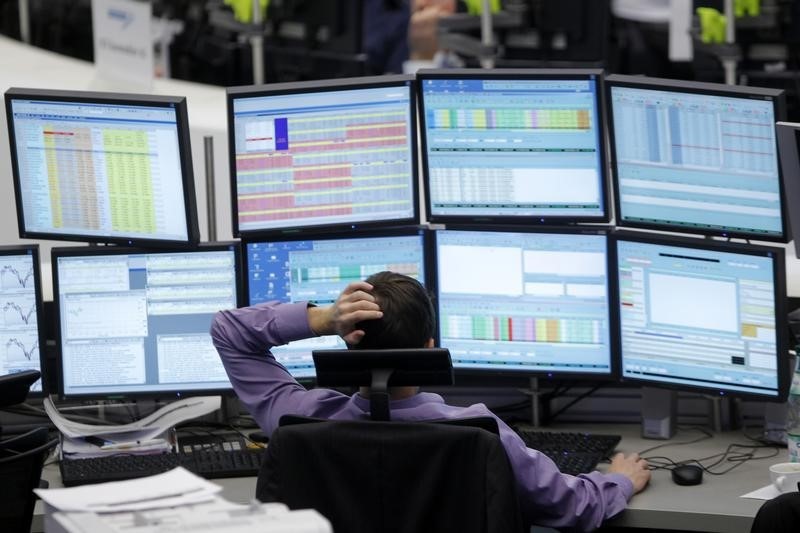This post was originally published on this site
https://i-invdn-com.akamaized.net/news/LYNXNPEB9M0BY_M.jpg
A key Wall Street metric shows discretionary hedge funds are raising their U.S. equity exposures from historic lows, just as their quantitative peers add fresh ammo to a $21 trillion rally in the teeth of the economic downturn.
Systematic strategies that take their cues from market swings are set to scoop up $380 million of American shares a day over the next three months if current volatility levels hold, according to BNP Paribas (OTC:BNPQY) SA. Meanwhile, Nomura Holdings (NYSE:NMR) reckons commodity trading advisers, which use derivatives to follow market trends, are ready to step up in kind.
While U.S. stocks looked set for a breather on Tuesday, optimism is growing over economic re-openings and Deutsche Bank AG (NYSE:DB) says institutional cash is now following the trail blazed by the mom-and-pop cohort that has powered the S&P 500’s comeback.
“Retail investors appear to have timed the market well,” BNP Paribas strategists led by Greg Boutle wrote in a note. “A squeeze in short positioning, buying flows from CTAs and target volatility funds could drive a further overshoot in markets.”
The extremity of this year’s market turmoil has played havoc with many systematic strategies, which delevered amid the rout and whose buying signals were then muddied by cross-asset volatility. Meanwhile a slew of hedge funds were hit by redemptions during the selloff and the economic outlook has offered few incentives for risk-taking.
Yet inexperienced retail investors have stayed greedy while the pros were fearful. Discount brokerages like Charles Schwab (NYSE:SCHW) Corp. and TD Ameritrade (NASDAQ:AMTD) Holding Corp. for example saw record new accounts opened and trading volume in the first part of the year, as bored millenials played the market via consumer-friendly apps.
On the heels of better-than-expected data, investors are pouring cash into stocks acutely exposed to the economic cycle. They’ve plowed almost $3 billion into exchange-traded funds tracking previously unloved financial shares this month, while yanking more than $2 billion from vehicles following tech companies.
In the wake of upside economic surprises, various breeds of quant will soon be forced to start buying more shares, according to Nomura’s Masanari Takada.
Trend followers known as commodity trading advisers will likely move into equities after dumping their holdings in bond futures, he wrote in a Monday note. Some systematic players may even jump ahead of their usual schedules to play catch-up.
“Some risk-parity funds may embark on emergency rebalancing, selling bonds and buying equities without waiting for the usual month-end timing,” Takada said.
Both systematic and discretionary exposures slumped amid the first quarter turmoil. While that’s starting to pick up, volatility-control, risk parity and long/short hedge funds remain in the single-digit percentiles of their equity positioning, according to Deutsche Bank (DE:DBKGn).
Tracking the fast money on Wall Street is far from straightforward, but one gauge of exposures — based on estimates of returns attributable to the benchmark, or beta — shows hedge fund exposure ticking up, though still well below recent highs.
Data from Credit Suisse (SIX:CSGN) Group AG paints a similar picture for macro and CTA funds — stock exposure has turned higher since late May, but remains historically low.
With both historic and implied volatility continuing to drop, investors that look to market swings for allocation decisions will also start to see green lights flash for stocks, according to BNP Paribas.
The 10-day realized volatility of the S&P 500 Index recently slumped to its lowest since February, dragging the Cboe Volatility Index — a measure of expected swings — to 26, well below its average for this year.
The counter argument to all this tentative buying is that the market rebound has gone too far, too fast — and that fear could yet keep big money on the sidelines.
The world is not yet free from the grip of the coronavirus and the economic fallout remains unknown. Yet the S&P 500 has surged more than 40% off its March low.
No wonder there’s more than $4.7 trillion in money-market funds on haven demand.
“Everything seems to be priced almost to perfection,” Esty Dwek, head of global macro strategy at Natixis Investment Managers, told Bloomberg TV on Monday. “We don’t like to chase this rally. Especially now that sentiment is turning much more bullish and the rally is broadening, there is this question of disappointment risk.”
©2020 Bloomberg L.P.

